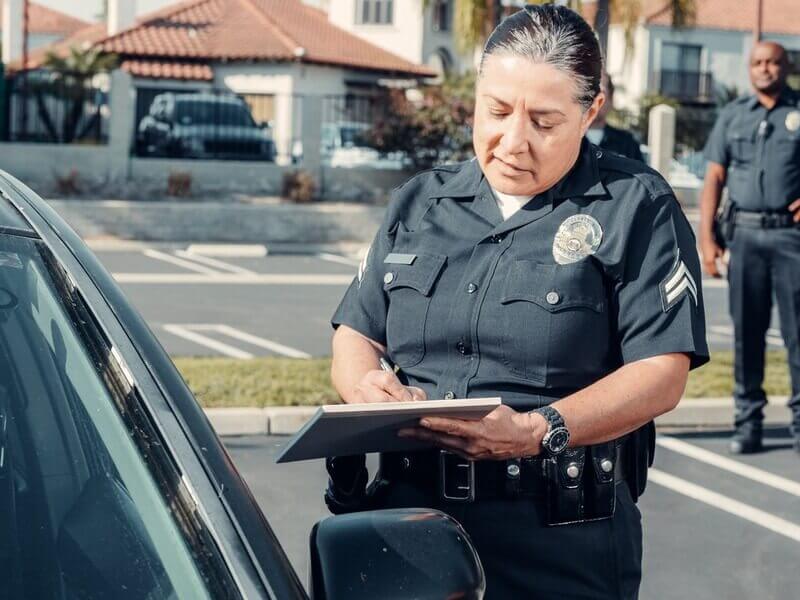
In order for a police officer to lawfully search a vehicle, they must first obtain a search warrant. All warrantless vehicle searches in Minnesota are presumed to be unconstitutional.
In Minnesota, search warrant requirements necessitate law enforcement to demonstrate ‘probable cause’ to a judge, indicating a reasonable belief that a crime has occurred or will occur at the specified location. This ‘probable cause’ is founded on specific facts or circumstances supporting the suspicion of criminal activity.
If the police want to conduct warrantless vehicle searches, the justification of the search must fall under one of seven exceptions to the warrant requirement.
These search warrant exceptions will be discussed individually in future posts, but for now, the exceptions are:
- Search Incident to Arrest
- Plain View Seizure of Evidence
- Probable Cause to Search for Evidence
- Inventory Search
- Protective Weapons Search
- Consent Search
- Medical Emergency Search
In this article, our Minnesota criminal defense lawyers go over the ins and outs of what constitutes probable cause to search a vehicle in Minnesota.
If you have questions, contact the team at Arechigo & Stokka today.
Search Incident to Arrest
In the context of motor vehicles, this search warrant exception allows Minnesota police officers to lawfully search an occupant of a vehicle and the passenger area of the vehicle
- At the time of arrest the arrested person could easily access the passenger area of the vehicle and any containers in the vehicle; or
- If there is a reasonable belief that evidence of the crime for which the person was arrested might be found in the vehicle. This search warrant exception first requires a lawful arrest.
If the police did not have a right to place the person under arrest, evidence found during any subsequent search will not be admissible.
However, if these factors are met, the police may lawfully search the passenger area of the vehicle, including any containers, bags, purses, luggage
Plain View Seizure of Evidence
This search warrant exception allows Minnesota police officers to seize evidence of criminal activity that is in plain view.
In other words, if, after a lawful traffic stop, the officer approaches the vehicle and sees a bag of marijuana on the passenger seat, the officer can lawfully seize that evidence without getting a search warrant.
It is not a search to see something in plain sight. It must be immediately apparent to the officer what he is seeing is evidence of criminal activity before he can seize it without a search warrant.
A police officer could not, for example, grab a pack of cigarettes to open it and see whether there is a bag of marijuana in it. Cigarettes are not illegal.
The officer
Probable Cause to Search a Car for Evidence
This search warrant exception is somewhat unique to motor vehicles. Generally, a Minnesota police officer needs probable cause and a search warrant to lawfully search a car for evidence.
Felony 5th Degree Controlled Substances Charges Dismissed
State Dismisses Client’s Felony Drug Possession Charges in Blue Earth County
THE FACTS: Client was charged with Felony 5th Degree Drug Possession in Blue Earth County. The drugs were discovered in the client’s vehicle after the police searched his car following a routine traffic stop for expired tabs. The client had felony amounts of marijuana and psilocybin mushrooms in his vehicle. This client’s case had occurred shortly before Minnesota legalized marijuana. The police officer did not have a warrant to search the client’s vehicle. The office asserted a right to search under what’s known as the automobile exception to the warrant requirement. This exception allows police to search a vehicle without a warrant if police can provide probable cause to believe evidence of a crime will be found in a vehicle. In this case, the police officer attempted to base probable cause on noticing an alleged odor of green marijuana. The officer told the client he could smell marijuana and asked for consent to search the car. The client consented to the search. The officer then searched the client’s vehicle and discovered the drugs.
THE DEFENSE: We filed a motion to suppress the drugs found in the car arguing that the officer unlawfully expanded the scope of the traffic stop when he began questioning the client about drugs in the car. We argued that the odor of marijuana by itself no longer provided police with a lawful basis to ask a motorist if there were drugs in the car or if they could search the stopped vehicle. The Minnesota Supreme Court had recently issued its opinion in State v. Torgersen, which supported our argument. Torgersen held that since not all possession of marijuana is unlawful, it was therefore not a crime to possess marijuana and police could not ask for permission to search a stopped vehicle based solely on an odor of marijuana. The state initially opposed our arguments and indicated an intent to prosecute our client. However, the state changed its position and agreed with our assessment shortly before the contested evidentiary hearing was scheduled.
THE RESULT: The Blue Earth county attorney ultimately agreed with attorney John Arechigo’s view of the law and agreed that the officer lacked probable cause to search the client’s vehicle. The state dismissed the client’s felony drug possession charges. We’re now pursuing a full expungement of the client’s records.
However, due to the mobile nature of motor vehicles, courts have held that as long as the police officer has probable cause to believe evidence of a crime is concealed somewhere in the vehicle, the officer may stop and search the vehicle without a search warrant.
This includes the right to search all packages, bags, and containers that may reasonably hide or contain the evidence.
As long as the police officer has enough information to where he could get a search warrant, the mobile nature of motor vehicles does not require the officer actually get the search warrant. But, the officer still needs a probable cause belief of criminal activity first.
Inventory Search
If the police are going to tow your vehicle following a lawful traffic stop and/or lawful arrest, they can conduct an inventory search of the vehicle without a search warrant.
Most police departments have policies authorizing an inventory search of an impounded vehicle; however, the policy must make clear that the inventory search is part of routine procedure in cases that involved the tow.
The police cannot conduct a search for purposes of finding evidence. The search must be conducted pursuant to department policy to inventory the contents that the police are taking into custody.
If the police do happen to find drugs in the vehicle, or any other evidence of criminal activity, that evidence will be admissible and will be used against you.
Protective Weapons Search
Following a lawful traffic stop, the police officer may conduct a limited pat-down search of a person’s clothing if the officer has a reason to believe the person may be armed with a dangerous weapon.
The officer must be able to specifically describe why he thought the person was armed with a dangerous weapon if the evidence is challenged in court.
This limited right to conduct a weapons search can extend to the passenger area of the vehicle, including any containers or bags in the vehicle.
This is the most restrictive search warrant exception. There are several conditions to be met before a police officer can frisk a driver or passenger and before the officer can expand the search into the vehicle.
Consent Search
As some may know, the police do not have to get a search warrant if the person consents to search. The same is true for searching motor vehicles, with one catch.
The police officer must have a reason to suspect criminal activity before he can ask the owner or driver of the vehicle for permission to search.
If the officer legitimately suspects criminal activity and the owner or driver gives the officer permission to search, the officer can search the vehicle without a search warrant.
If the owner or driver of the vehicle specifically limits the areas or things they agree an officer can search, the officer must limit the scope of the search to only that area.
For example, if the officer asks the driver if he can search the vehicle and the driver says you can only search the backseat, then the officer cannot search the trunk without further evidence of criminal activity. Evidence found during a lawful consent search will be admissible in court.
Contact Our Criminal Defense Lawyers in Minnesota Today
If you or someone you know was recently the subject of a police vehicle search, make sure you contact the St. Paul criminal defense lawyers at Arechigo & Stokka today.
Our experienced criminal defense lawyers in Minnesota will review each and every circumstance surrounding the search of your vehicle.
If the police search does not fall under one of these search warrant exceptions, our aggressive Minnesota criminal defense lawyers will fight to have the evidence thrown out of court.





